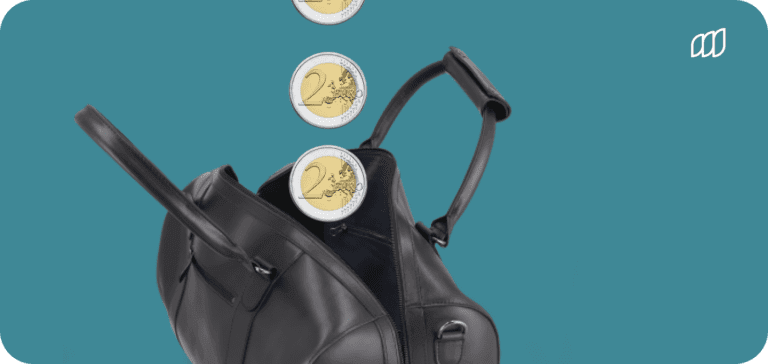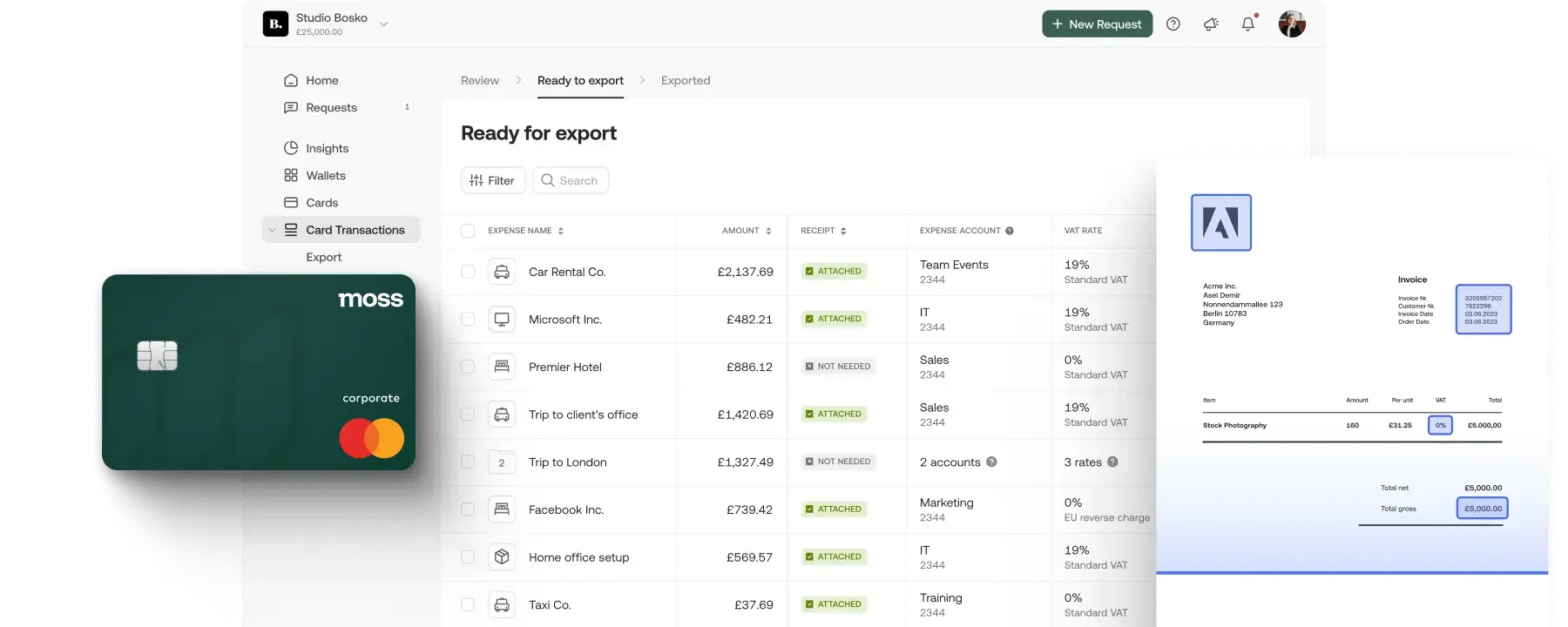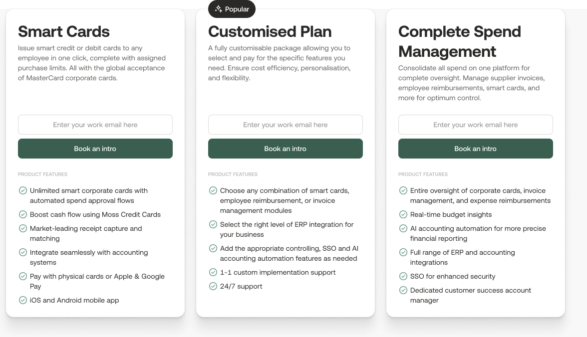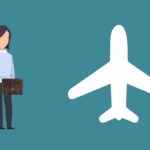Anyone undertaking a business trip for the employer usually has expenses for this trip – be it for meals, accommodation, or transport. Under certain conditions, these travel expenses are tax-deductible. Our guide reveals which specific conditions apply, which travel expenses can be claimed, and which solutions companies can use to simplify business travel for their employees.
Travel expense policies – this must be considered

In 2020 and 2021, business travel plummeted due to COVID-19. In 2023 we’re seeing business travel return to normal as the effects of the pandemic fade. Although it is unlikely that there will ever be as many business trips in the future as before, there are still issues best discussed and settled in person. Not every social interaction can be replaced by a Zoom meeting. For such business trips, it is crucial to know what the fiscal opportunities are, both for the employee and for the employer.
Travel expenses are usually exempt from tax by HMRC. To claim expenses incurred for tax purposes, corresponding receipts must therefore be kept and submitted. After all, it must be possible to prove these costs. An overview illustrates what kind of travel expenses are affected by the tax exemption.
Tax exemption applies to the following types of expenses in business travel:
- public transport
- hotel accommodation
- food, as well as drinks
- congestion and toll charges
- parking fees
- professional telephone calls
- printing costs
- mileage
All these sorts of costs can be exempted from tax at HMRC, provided they are incidental to business travel. However, it is not always possible to distinguish clearly between a mere business trip and a business trip with partly private share – or to determine which expenses incurred on a business trip are of a private nature.
Distinction of business and private travel
For HMRC, there are only two kinds of travel considered to be business travel and which can accordingly benefit from tax exemption: one being trips undertaken by employees in the course of their professional duties – for example, client meetings. The other is travel to some place where their presence is required to fulfil duties – this includes, for instance, visits to construction sites or temporary workplaces, as it often occurs in companies with international subsidiaries.
Please note, however, that the daily commute from home to the permanent place of work is explicitly not considered a business trip. Only travel that goes beyond this regular routine and is consequently of limited duration is considered as such. Furthermore, if a trip is made that actually does not lead to the permanent place of work, but is approximately the same distance, this trip cannot be taken into account for tax purposes either.
The following table provides a clear overview of which expenses on a business trip are of a business and which are of a private nature. A distinction is made between costs that can be exempted from tax and those that are not deductible.
| Deductible | Non-deductible |
| Work-related travel not to or from the permanent workplace | The regular way to the permanent workplace, there and back |
| Accommodation costs during a several-day business trip | Travel expenses not strictly related to work – e.g., recharging a travel card |
| Food and drink on a business trip; either the actual costs or lump sums per day | Tickets for illegal parking or speeding; penalty charges in general |
| Dinner and breakfast when a business trip runs overnight |
UK travel rules for employees

If the costs of a business trip are incurred by an employee and are not covered by the employer, the employee has the option of reclaiming the taxes from the government.
There are different requirements to be met:
- The travel expenses exclusively incurred for work-related reasons.
- The employee has covered these travel expenses personally.
- The employer does not reimburse the employee for the travel expenses.
- The employer has not provided the employee with a suitable alternative.
- The employee pays taxes.
The last aspect is especially significant: the regulation involves a tax relief. A tax relief, in turn, implies that taxes are paid in the first place. The relief depends on the amount of tax paid and the tax rate. The relevant expenses and, if applicable, supporting documents must be submitted within four years of the end of the tax year in question.
For example: If travel expenses amount to £60 and the employee has a tax rate of 20 per cent in the year in which the expenses were incurred, then the employee can claim a tax break of £12.
Permanent and temporary workplaces: travelling time is decisive
As mentioned above, a basic distinction must be made between permanent and temporary places of work to determine whether travel expenses can be claimed. What constitutes a permanent workplace is obvious in most cases: the office, shop, or factory where the work is done every day. A temporary place of work, on the other hand, is one that is only visited occasionally or only for a short time before returning to the permanent workplace. The regulation only applies up to a period of 24 months. After that, the place of work is no longer considered temporary and thus can no longer be taken into account for tax purposes.
Corporate travel and expense management: provisions for employers

Employers also have the option of claiming their employees’ travel expenses for tax purposes – provided they have covered their costs. To do this, they must report the expenses to HMRC.
Employers must take certain things into consideration:
- To deduct the costs of their employees’ business trips, these must have a distinct and exclusive business origin and must not serve private pleasure.
- The business trip itself may have a private share – but only the professional expenditure can be claimed for tax purposes.
- If private expenses, such as transport to a private destination, are covered, this is considered employee compensation and is then relevant for National Insurance.
- The expenses for fuel or food are legally set at fixed rates. If the employer reimburses the employee more than these fixed rates, the difference is considered remuneration and thus a kind of wage and is therefore subject to PAYE and National Insurance.
The prerequisite for keeping track of all this and for being able to allocate costs correctly is proper corporate travel and expense management. In combination with accounting software such as XERO, employees’ business trips can thus be easily managed.
Travel expense management: fixed rates and exceptions

Not all expenses are deductible in their entirety. Certain types of travel costs can only be deducted at a certain amount set by HMRC. These fixed rates are intended to prevent business travellers from financing a dissolute life at the expense of the state. These fixed rates apply in particular to meals and fuel.
Fuel Rates
The first expenditure item for which HMRC determines how much businesses can claim in tax is fuel. Since the efficiency of vehicles may vary considerably, as does the price of fuel depending on the type of fuel, HMRC has set limits up to which companies can refinance the fuel costs of their employees tax-free – for example, on business trips in a company car. Or if employees must repay the employer after private journeys with the company car. In both cases, the advisory fuel rates apply.
These advisory fuel rates are usually adjusted on a quarterly basis, depending, among other things, on the latest fuel price development. Various factors contribute to the calculation: type of fuel, size of the engine, or fuel consumption. The rates can be found on the HMRC website. Currently, they range between 9 and 25 pence per mile travelled, except for electric cars, which are charged 5 pence.
Costs for Food
The same applies to meals: companies can cover their employees’ expenses and thus save tax. However, HMRC sets limits on the extent to which this is possible. For example, if employees eat a particularly expensive meal, companies do not have to pay the full cost.
You have several options to refinance your employees’ expenses for meals:
- You bear the costs at the rate set by HMRC.
- You negotiate an individual rate with HMRC if, for example, the company needs to have its employees dine at particularly expensive venues for representative reasons.
- You pay the full cost for your employees but can only deduct it up to the maximum amount set by HMRC.
The amount of the fixed rates for meals depends on the length of the journey.
| Minimum length of the trip | Maximum meals expenses |
| 5 hours | £5 |
| 10 hours | £10 |
| 15 hours | £25 |
There is also a cap of £5 for breakfast. For dinner after 8pm the cap is £15, as it is assumed that the employee works longer hours than usual and cannot eat at home.
Moss: travel and expense management made easy

Moss makes corporate expense management much easier. With Moss Corporate Cards, employees can make instant payments on behalf of the company when travelling on business – without having to advance any money – and then reclaim it from the employer later. They can upload the corresponding receipts via the web and mobile app to be stored in the application.
The employer can collate the documents and has access to them whenever they are requested by HMRC. And the accounts department can easily export them to accounting software such as XERO and match them with payments, without having to request the receipts from the employees themselves.
When employees enter their travel data in the application, Moss will also automatically calculate the flat rates and per diems of the trip, depending on the length of the business trip and the destinations. If employees should pay in advance and submit the relevant data to Moss, the employer can reimburse the costs with just a few clicks and immediately credit the employee’s account – or transfer the sum along with the next salary.
FAQs
There are several types of expenses during a business trip that may be exempt from tax. These include public transport, hotel accommodation, meals as well as drinks, congestion and toll charges, parking fees, professional telephone calls, printing costs, and mileage. Depending on the specific kind of expenses, they will be reimbursed either in full or at fixed rates set by HMRC.
The rates for meals depend on the length of the trip. From five hours, £5 can be claimed, from 10 hours £10, and from 15 hours £25. For breakfast, a rate of £5 applies, for dinner after 8 p.m. it is £15. Abroad, however, rates vary from country to country and sometimes city to city, depending on the local cost of living.
The fuel costs you can deduct per mile on a business trip in a company car depend on various factors – such as the size of the engine, fuel consumption, and type of fuel. HMRC’s fixed rates currently range between 9 and 25 pence but change quarterly according to the prevailing fuel prices. The fixed rate for electric cars is 5 pence per mile.
Business travel is any travel that serves a distinct professional purpose. These can be short business trips to meet with business partners or trips lasting several weeks that require an employee to work on the go – such trips can be deducted for up to 24 months. Commuting between home and permanent place of work is not considered a business trip.
Various types of travel expenses are tax deductible – from public transportation and hotel accommodations to congestion, toll, or parking fees. The tax exemption is determined by the amount of the expenses. Fixed rates set by HMRC apply to meals and mileage in company cars.
Certain conditions must be met for the reimbursement of travel expenses: The expenses were paid in full by the employees themselves. The costs are work-related and did not serve private pleasure. The employer did not reimburse the expenses and did not offer a suitable alternative. And the business traveller is a taxpayer.








